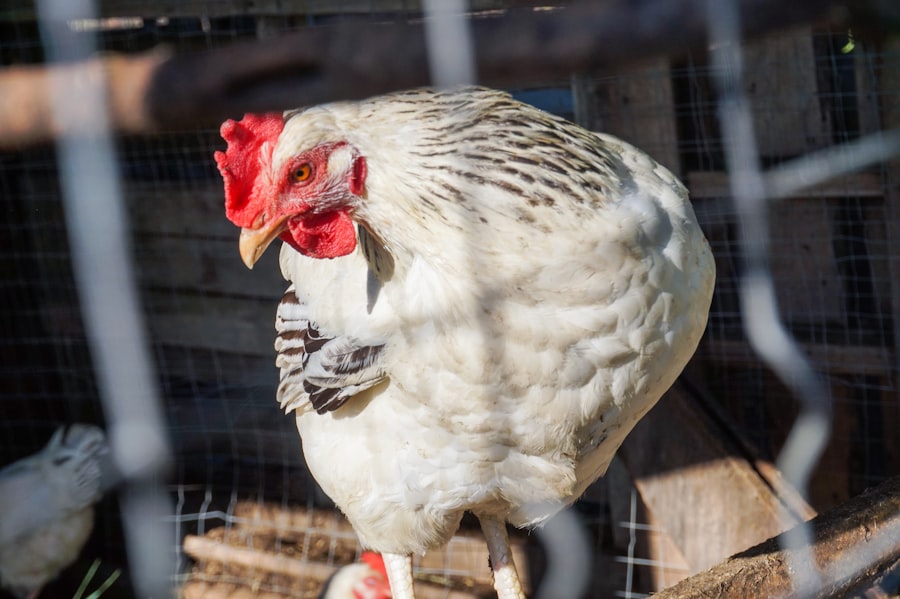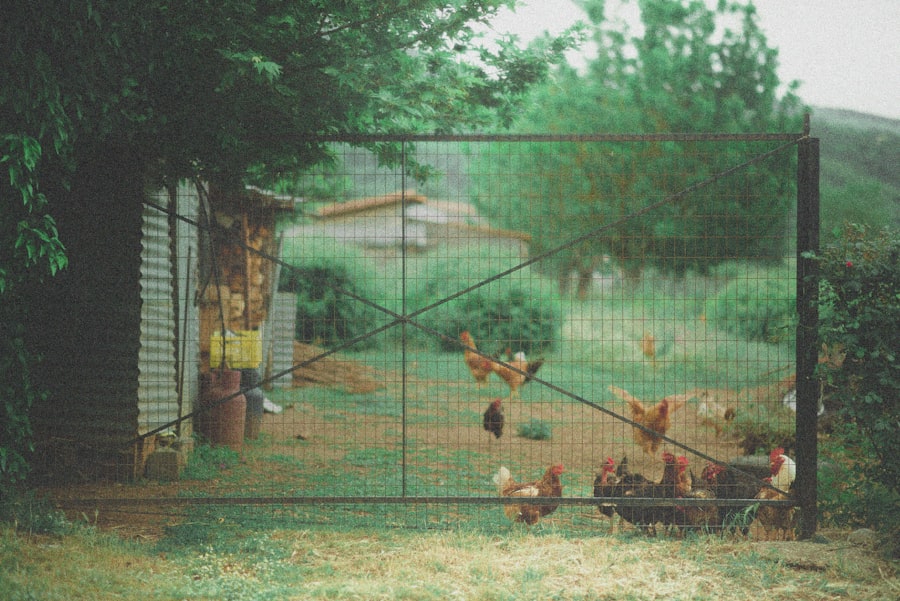When selecting meat chicken breeds for farming, several factors must be considered to ensure optimal production. The Cornish Cross is a popular choice among commercial farmers due to its rapid growth rate and high meat yield. This breed efficiently converts feed into meat, making it cost-effective for large-scale operations.
For small-scale farmers or those prioritizing free-range environments, the Red Ranger is a suitable option. Although it grows more slowly than the Cornish Cross, the Red Ranger is known for its hardiness, excellent foraging abilities, and flavorful meat. This breed adapts well to outdoor conditions and is favored by farmers seeking a more natural approach to meat chicken production.
The Freedom Ranger is another breed that excels in outdoor environments. It is a slower-growing breed that appeals to farmers looking for a more natural production method. This breed is well-suited for free-range or pasture-raised systems.
When choosing a meat chicken breed, farmers must consider factors such as growth rate, feed efficiency, and environmental adaptability. Additionally, specific farming goals and available resources play a crucial role in breed selection. Farmers with limited space and resources may prefer breeds with higher feed conversion efficiency, while those with ample space for free-range systems may opt for breeds better suited to foraging.
Ultimately, the ideal breed for a meat chicken farm depends on a combination of factors, including production goals, available resources, and the specific characteristics of each breed. Careful consideration of these elements can help farmers select the most appropriate breed for their operation, maximizing the success of their meat chicken farm.
Table of Contents
- 1 Creating the ideal housing for meat chickens
- 2 Providing a balanced diet for meat chickens
- 3 Ensuring proper hygiene and cleanliness for meat chickens
- 4 Managing the health and well-being of meat chickens
- 5 Slaughtering and processing meat chickens
- 6 Tips for successful meat chicken farming
- 7 FAQs
Key Takeaways
- Choose a meat chicken breed that is known for its fast growth and high meat yield
- Provide a spacious and well-ventilated housing for meat chickens to prevent overcrowding and stress
- Offer a balanced diet of high-quality feed, water, and occasional supplements to ensure proper growth and development
- Maintain a clean and hygienic environment by regularly cleaning the coop and providing proper waste management
- Monitor the health of meat chickens regularly and provide necessary vaccinations and treatments to prevent diseases
- Follow proper slaughtering and processing techniques to ensure the meat is safe for consumption
- Regularly monitor and adjust farming practices to ensure the success and profitability of meat chicken farming
Creating the ideal housing for meat chickens
Space and Comfort
Adequate space is crucial for meat chickens to thrive. Overcrowding can lead to stress, aggression, and increased risk of disease, so it’s essential to provide enough space for your chickens to move around comfortably.
Ventilation and Air Quality
Proper ventilation is vital to maintain good air quality and prevent respiratory issues. This can be achieved through windows, vents, or fans to ensure proper airflow within the housing structure.
Bedding, Layout, and Predator Protection
Providing appropriate bedding material, such as straw, wood shavings, or sand, is important for maintaining cleanliness and comfort within the chicken coop. The layout and design of the housing structure should facilitate easy access for cleaning and maintenance, including features like removable roosts, nesting boxes, and easy-to-clean flooring. Lastly, ensuring that the housing structure is predator-proof is crucial to protect your meat chickens from potential threats.
Providing a balanced diet for meat chickens

Providing a balanced diet is essential for the health and productivity of meat chickens. A well-balanced diet should include a combination of high-quality feed, fresh water, and access to natural foraging opportunities. When it comes to feed, it’s important to choose a high-quality commercial feed that is specifically formulated for meat chickens.
These feeds are typically high in protein and essential nutrients to support rapid growth and muscle development. Additionally, providing access to fresh water at all times is crucial for proper hydration and overall health. Clean water should be provided in a way that prevents contamination from feces or bedding material.
In addition to commercial feed and water, allowing meat chickens access to natural foraging opportunities can provide additional nutrients and enrichment. This may include allowing chickens to free-range in a pasture or providing access to grassy areas where they can peck at insects and plants. This not only provides additional nutrients but also allows chickens to engage in natural behaviors such as scratching and dust bathing.
It’s important to monitor the condition of your meat chickens regularly to ensure that they are maintaining a healthy body condition and are receiving adequate nutrition. By providing a balanced diet that includes high-quality feed, fresh water, and access to natural foraging opportunities, you can support the health and productivity of your meat chickens.
Ensuring proper hygiene and cleanliness for meat chickens
Maintaining proper hygiene and cleanliness is essential for preventing disease and promoting the overall health of meat chickens. This includes regular cleaning of the housing structure, providing clean bedding material, and managing waste effectively. Regular cleaning of the chicken coop or housing structure is crucial to remove feces, spilled feed, and other debris that can harbor bacteria and parasites.
This may involve daily spot cleaning as well as periodic deep cleaning of the entire housing structure. Additionally, providing clean bedding material such as straw or wood shavings can help absorb moisture and odors while providing a comfortable resting surface for meat chickens. It’s important to regularly replace soiled bedding material to maintain cleanliness within the housing structure.
Managing waste effectively is also important for maintaining hygiene within the chicken coop. This may involve regularly removing and disposing of soiled bedding material as well as implementing a composting system for organic waste. Furthermore, practicing good biosecurity measures can help prevent the introduction and spread of disease within your meat chicken farm.
This may include limiting visitor access, quarantining new birds before introducing them to the flock, and regularly disinfecting equipment and footwear. By ensuring proper hygiene and cleanliness within your meat chicken farm, you can minimize the risk of disease and promote the overall health and well-being of your chickens.
Managing the health and well-being of meat chickens
Managing the health and well-being of meat chickens is essential for ensuring their productivity and longevity. Regular health checks are important for monitoring the condition of your chickens and identifying any potential issues early on. This may involve observing their behavior, checking for signs of illness or injury, and monitoring their overall body condition.
Additionally, providing a clean and comfortable living environment is crucial for supporting the health and well-being of meat chickens. Preventative measures such as vaccination programs can help protect your meat chickens from common diseases such as Marek’s disease or Newcastle disease. Consult with a veterinarian or poultry health expert to develop a vaccination program that is tailored to the specific needs of your flock.
Additionally, providing a balanced diet that meets their nutritional needs is essential for supporting their overall health and productivity. Furthermore, managing stress within the flock is important for promoting their well-being. This may involve minimizing disturbances within the housing structure, providing adequate space for each chicken, and avoiding sudden changes in their environment.
By managing the health and well-being of your meat chickens through regular health checks, preventative measures, balanced nutrition, and stress management, you can support their overall productivity and longevity.
Slaughtering and processing meat chickens

Humane Slaughtering Methods
When it comes to slaughtering meat chickens, it’s essential to do so in a humane manner that minimizes stress and discomfort for the birds. This can be achieved by using methods such as controlled atmosphere stunning or electrical stunning followed by bleeding out, ensuring a quick and painless process.
Ensuring Food Safety during Processing
After slaughtering, it’s crucial to process the meat chickens in a clean and sanitary environment to ensure food safety. This involves eviscerating the birds, chilling them quickly to prevent bacterial growth, and packaging them in a way that maintains freshness and quality. Proper food safety practices must be followed throughout the processing stage to minimize the risk of contamination or spoilage.
Compliance with Local Regulations and Requirements
It’s also important to consider local regulations and requirements when slaughtering and processing meat chickens for sale or distribution. This may involve obtaining necessary permits or certifications, following specific processing guidelines, or working with a licensed processor. By carefully considering animal welfare practices, food safety measures, and regulatory requirements, you can ensure that your products meet high standards of quality and safety.
Tips for successful meat chicken farming
Successful meat chicken farming requires careful planning, attention to detail, and dedication to best practices. Here are some tips to help you succeed in your meat chicken farming venture: 1. Start with a clear plan: Before starting your meat chicken farm, take the time to develop a clear business plan that outlines your goals, resources, and strategies for success.
2. Choose the right breed: Select a breed of meat chicken that is well-suited to your farming goals and resources. 3.
Provide an ideal housing environment: Design a housing structure that provides adequate space, ventilation, cleanliness, and predator protection for your meat chickens. 4. Offer a balanced diet: Provide high-quality feed, fresh water, and access to natural foraging opportunities to support the health and productivity of your meat chickens.
5. Maintain proper hygiene: Regularly clean the housing structure, provide clean bedding material, manage waste effectively, and practice good biosecurity measures. 6.
Monitor health and well-being: Conduct regular health checks, implement preventative measures such as vaccination programs, provide balanced nutrition, and manage stress within the flock. 7. Slaughter and process with care: Ensure humane slaughtering practices and follow proper food safety measures when processing meat chickens.
By following these tips and best practices for successful meat chicken farming, you can maximize the productivity and profitability of your operation while promoting the health and well-being of your meat chickens.
If you’re interested in learning more about keeping meat chickens, you might also want to check out this article on turning a shed into a chicken coop. This article provides valuable information on creating a suitable living space for your chickens, which is essential for their health and well-being.
FAQs
What are meat chickens?
Meat chickens, also known as broiler chickens, are specifically bred and raised for their meat. They are typically raised for a short period of time before being processed for their meat.
How do you keep meat chickens?
To keep meat chickens, you will need to provide them with a suitable housing environment, access to clean water and high-quality feed, and proper care and management to ensure their health and well-being.
What type of housing do meat chickens need?
Meat chickens require a well-ventilated and spacious housing environment that protects them from predators and extreme weather conditions. The housing should also be easy to clean and maintain.
What do meat chickens eat?
Meat chickens require a high-protein diet to support their rapid growth. They are typically fed a commercial broiler feed that is specifically formulated to meet their nutritional needs.
What are some common health issues for meat chickens?
Common health issues for meat chickens include respiratory problems, leg issues, and heat stress. It is important to monitor their health and provide appropriate veterinary care when needed.
How long does it take to raise meat chickens?
Meat chickens are typically raised for 6-8 weeks before they are ready for processing. The exact time may vary depending on the breed and specific management practices.
Meet Walter, the feathered-friend fanatic of Florida! Nestled in the sunshine state, Walter struts through life with his feathered companions, clucking his way to happiness. With a coop that’s fancier than a five-star hotel, he’s the Don Juan of the chicken world. When he’s not teaching his hens to do the cha-cha, you’ll find him in a heated debate with his prized rooster, Sir Clucks-a-Lot. Walter’s poultry passion is no yolk; he’s the sunny-side-up guy you never knew you needed in your flock of friends!







